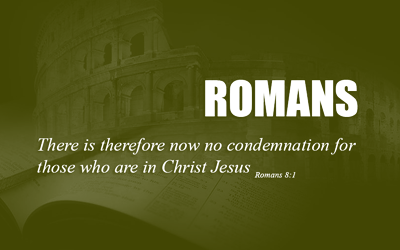Romans Chapter 11
The remnant - God’s way of selection. Saved by grace. The law ensnares those who rely on it.
(Bấm vào đây để đọc tiếng Việt)
The remnant - God’s way of selection
1So I ask, God has not rejected his people, has he? Absolutely not! For I too am an Israelite, a descendant of Abraham, from the tribe of Benjamin. 2God has not rejected his people whom he foreknew! Do you not know what the scripture says about Elijah, how he pleads with God against Israel? 3“Lord, they have killed your prophets, they have demolished your altars; I alone am left and they are seeking my life!” 4But what was the divine response to him? “I have kept for myself seven thousand people who have not bent the knee to Baal.” 5So in the same way at the present time there is a remnant chosen by grace. (Romans 11:1-5)
 Paul recalled the prophet Elijah when he thought that no one among God's people followed Him anymore, but God let him know that there is still a "remnant" among them who still believed in Him. Today, when Paul wrote this letter, there is still a remnant. In the time of Elijah, God chose those who did not kneel before Baal, today how does He make his choices? Verse 5 let us know that God chose the remnant according to grace.
Paul recalled the prophet Elijah when he thought that no one among God's people followed Him anymore, but God let him know that there is still a "remnant" among them who still believed in Him. Today, when Paul wrote this letter, there is still a remnant. In the time of Elijah, God chose those who did not kneel before Baal, today how does He make his choices? Verse 5 let us know that God chose the remnant according to grace.
We may understand the meaning of “grace” according to two aspects. In one aspect, grace speaks of God’s mercies, and in another, it is the foundation of salvation by grace through faith and not by the works of the flesh. Paul presented both of these aspects in chapters 10 and 11, especially in verse 10:20 when he recalled Elijah’s words “I was found by those who did not seek me; I became well known to those who did not ask for me” to describe God’s mercies and His sovereignty, the aspect of salvation by grace through faith can be found in verse 11:6 which will soon follow.
If we are careful to preserve the context of all Pauline letters, including this very book of Romans which we’re studying here, though a certain amount of his writing is dedicated to God’s sovereignty which goes together with His mercies, an inherent character of the Almighty, a much greater amount is dedicated to show how God choose who He will save: by grace through faith and not by works of the flesh. Therefore we can understand the true meaning of verse 5: “So in the same way at the present time there is a remnant chosen by grace,” which is exactly how God makes His selection: those who will believe. Because faith walks hand in hand with grace. Galatians 3:12 also writes “… the law is not based on faith.”
Therefore there is a parallelism between how God choose those He saves in the time of Elijah and now in the time of Paul. Those who did not kneel before Baal and those who walked by faith. Those who kneeled before Baal and those who rely on the law–because when they rely on the law, they rendered Christ’s death on the cross of no value for them.
Saved by grace
6And if it is by grace, it is no longer by works, otherwise grace would no longer be grace. (Romans 11:6)
Paul further clarified the meaning of verse 5 above that grace is the foundation of salvation. He showed the enmity between grace and works, like light and darkness. If we rely on the law then we consider ourselves not in need of God’s grace. Moreover, if we cannot rely on good works to be saved, then neither can we rely on them to serve and live a life that is pleasing to God.
The law ensnares those who rely on it
7What then? Israel failed to obtain what it was diligently seeking, but the elect obtained it. The rest were hardened, 8as it is written, “God gave them a spirit of stupor, eyes that would not see and ears that would not hear, to this very day.” 9And David says, “Let their table become a snare and trap, a stumbling block and a retribution for them; 10let their eyes be darkened so that they may not see, and make their backs bend continually.” (Romans 11:7-10)
What Isarael has been looking for is the righteousness of God, but they cannot find it because according to Romans 9:31: “but Israel even though pursuing a law of righteousness did not attain it.” They could not find it because “For no one is declared righteous before him by the works of the law” (Romans 3:20). And the remnant were saved according to verse 5: “chosen by grace.” This is the reality of what Jesus said in the parables of the king’s banquet in Matthew 22:14: “For many are called, but few are chosen.” Israel was called to be God’s people but only a small minority was chosen, those are the people who placed their trust on Christ.
Paul recalled the words of King David in Psalms 69:22-23 which foretold the people’s rejection of Christ: “22May their dining table become a trap before them! May it be a snare for that group of friends! 23May their eyes be blinded! Make them shake violently!” Their table must have been where they placed their offerings, the meats and drinks, where they thought their offerings will bring them righteousness. Little did they realize the law and statutes that they rely on became their judgement, which nullified the effect of Christ’s death which was the only means to salvation. They became blind because though they heard the proclamations of the prophets concerning Christ, they did not believe. And their backs bent backward because of the increasing burden of precepts upon precepts, rules upon rules.
Isaiah 28:9-13 wrote: “9Whom shall he teach knowledge? and whom shall he make to understand doctrine? them that are weaned from the milk, and drawn from the breasts. 10For precept must be upon precept, precept upon precept; line upon line, line upon line; here a little, and there a little … that they might go, and fall backward, and be broken, and snared, and taken.”
Hopefully the reader can spot the parallelism between the writings of Isaiah, King David, and the apostle Paul: Israel relied on the law to achieve the righteousness of God but couldn’t find it, except for a small remnant who relied on God’s grace and were saved. The prophet Isaiah spoke these words mockingly that you who rely on the law, who can you teach? And who teaches you? To the little babies?–because only babies need the law, while the grown up can rely on faith. And this is the tendency of the law: line upon line, precept upon precept, ensnaring those who rely on it.
Conclusion
For the remainder of chapter 11, Paul presented God’s salvation plan to Israel, and reminded the Gentile Christians that it was God’s grace and through their faith that they were saved, therefore they should not boast.
Chapters 12 through 16 contain teachings on Christian living that I feel it unnecessary to play the role of a teacher to teach you any more than what is already written in the Scriptures that you can learn it yourselves under direct guidance of the Holy Spirit.
Nghi Nguyen
- Scripture quoted by permission. All scripture quotations, unless otherwise indicated, are taken from the NET Bible® copyright ©1996-2006 by Biblical Studies Press, L.L.C. All rights reserved.
Disclaimer: This is my own opinion on the topic, which does not necessarily reflect the church's theology, or beliefs of the individuals in it — Nghi Nguyen
